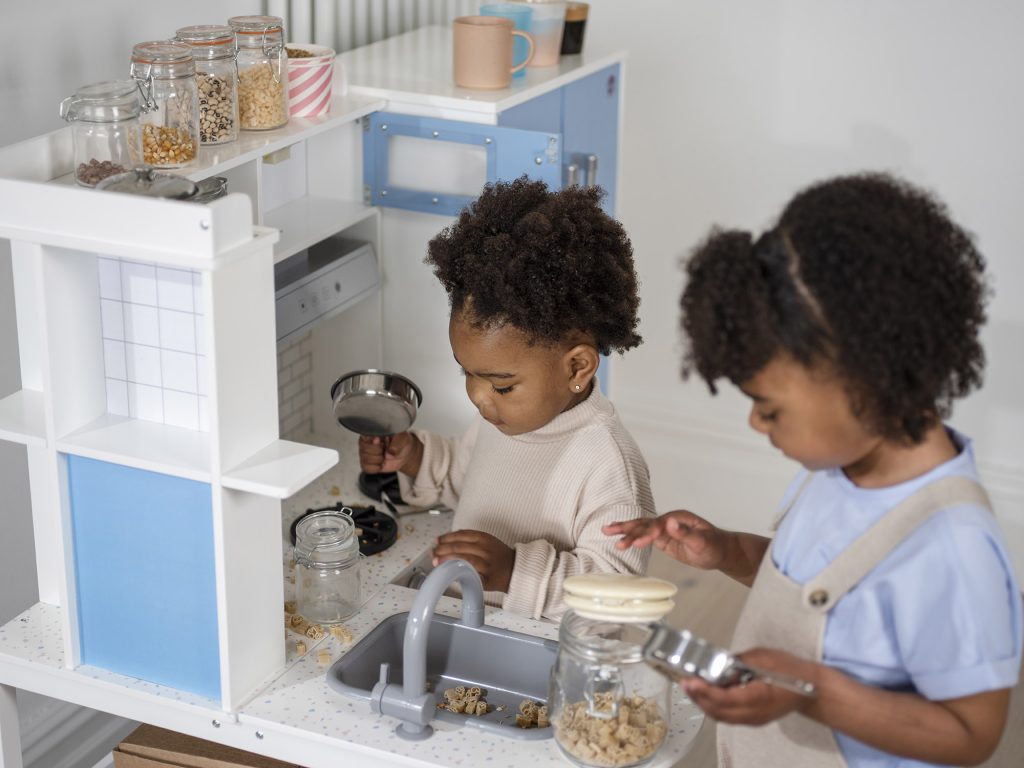
Plum Play believe that play should be imaginative, safe and inspire creativity. According to Early Years Matters, play “underpins learning and all aspects of children’s development”.
Play kitchens are a great way to encourage little ones to play different roles and give them the freedom to explore imaginative scenarios in a fun way.
Read on to discover some of the great benefits that using play kitchens can have for your children.
1. Creativity and Imagination
By using a play kitchen set, children can inspire their imagination. Perhaps they will play in the role of a Michelin star chef for the day, host a dinner party for friends or hold a cooking competition. Through taking on different roles in the play kitchen, children can have the freedom to express their creativity and experiment in their way, in the comfort of their own home.

2. Fine Motor Skills
Fine motor skills include making movements using small muscles in the wrists and hands. A play kitchen set is also a great way to encourage the development of fine motor skills.
Children can use dials to pretend to turn up the heat on the oven and open the cupboard doors. With the Bakehouse Traditional Wooden Kitchen with Fridge, they can even operate the imitation ice dispenser, all of which can help children to develop their skills whilst playing.

3. Visual Recognition
Recognising objects is something little ones learn as they grow. In the play kitchen, little ones can learn to recognise lots of things from food to utensils. There are lots of features of play kitchens that little ones will love and learn to recognise. The Penne Pantry Wooden Corner Kitchen with Fridge, with its sky-blue features, play kitchen utensils and baskets, provides an appealing setting for children to learn to recognise kitchen items.
4. Numeracy
Pretending in the play kitchen is a great way to get children to practice numeracy whilst they play. Perhaps children can count how many vegetables they need to make a dish or see what time dinner’s ready? You can count on a play kitchen to provide lots of fun ways to bring numeracy into play.

5. Planning and Organisation
Planning and organising are important skills that children learn, which help them improve their time management and learn how to prioritise. In the play kitchen, there can be lots of scenarios that children can play out that will also help them develop these skills. Like, planning how long a meal takes to cook, arranging who will sit where at the dinner table and organising who will do the washing up afterwards!

6. Social Skills
Social skills are significant as they allow children to communicate with others and build positive relationships. In the play kitchen, children can communicate with each other about what they’re cooking, help one another collect utensils and work together to prepare the dish. All helping to positively impact children’s social skills whilst playing.

7. Teamwork
Working together in the play kitchen means that children can create a sense of teamwork. Perhaps they need to take turns chopping up fruit or mixing the ingredients? Maybe they need to share the workspace or take it in turns to use the light-up cooking stove? Whatever the scenario, playing in this way helps children bond, work together and share.

8. Language and Communication
Children can practice communicating with each other about what needs doing in the kitchen, stocking up the fridge or pretending to put a load of laundry on to wash. Children can chat about cooking and cleaning as they play, which can help to broaden their language and communication skills too.

There are lots of benefits of play kitchens for children. So, why not bring imaginative play to life with a Plum Traditional Role Play Kitchen? Explore more here.
Your little ones can cook up a storm with the Penne Pantry Wooden Corner Kitchen with Fridge.
The L-shape counter is ideal for a small play space and the shape gives a large play area for pretend cooking.
Inspire hours of fun with the light-up and sound hobs, accompanied by a light up extractor fan and microwave oven. The modular fridge with pretend ice dispenser has plenty of storage room for ingredients! Inspire creativity further with the stainless-steel kitchen utensils, plastic cups with ice cubes and pastel peach baskets.
Spark your children’s passion for cooking and food with the Bakehouse Traditional Wooden Kitchen with Fridge.
The Bakehouse includes light-up and sound hobs, accompanied by a light-up extractor fan and microwave oven. The modular fridge with pretend ice dispenser has plenty of storage room for ingredients! Prepare a feast in the oven or put in some laundry with the open and close cabinet doors. Inspire imaginations further with the stainless-steel kitchen utensils and plastic cup with ice cubes.
Reference: Early Years Matters – https://bit.ly/3zoK96o






